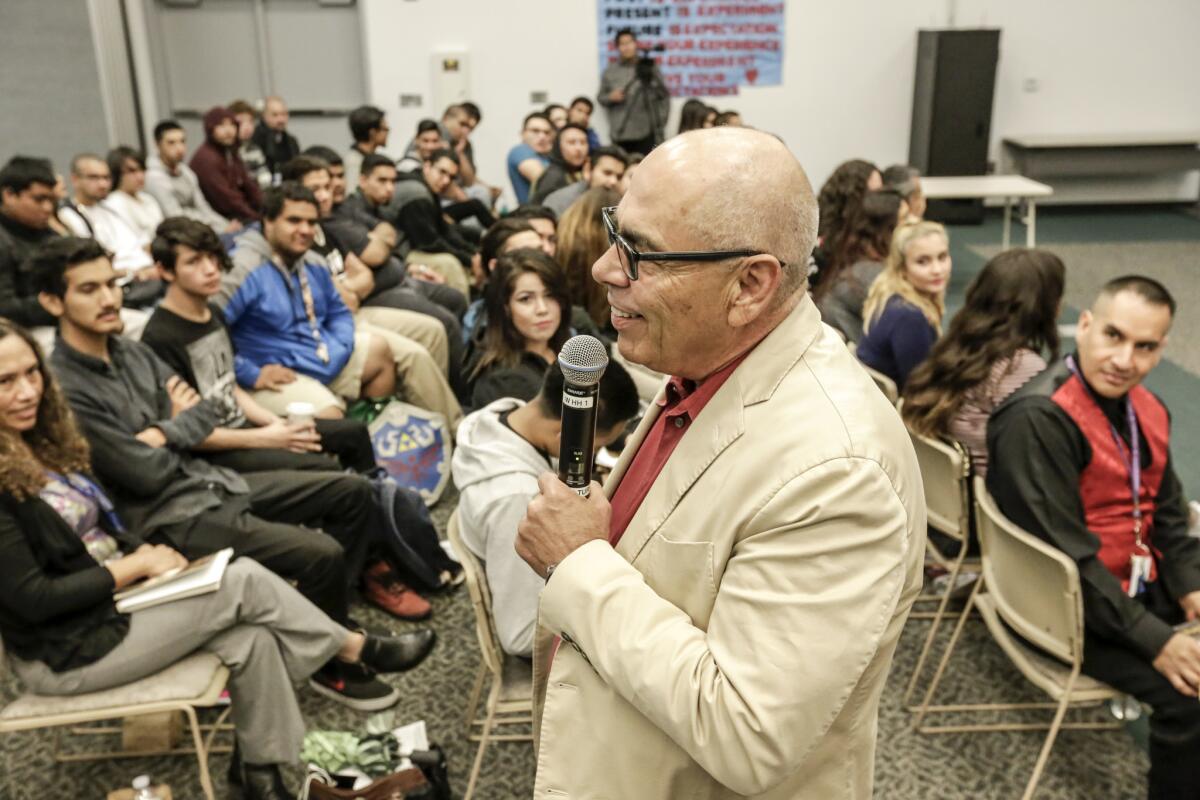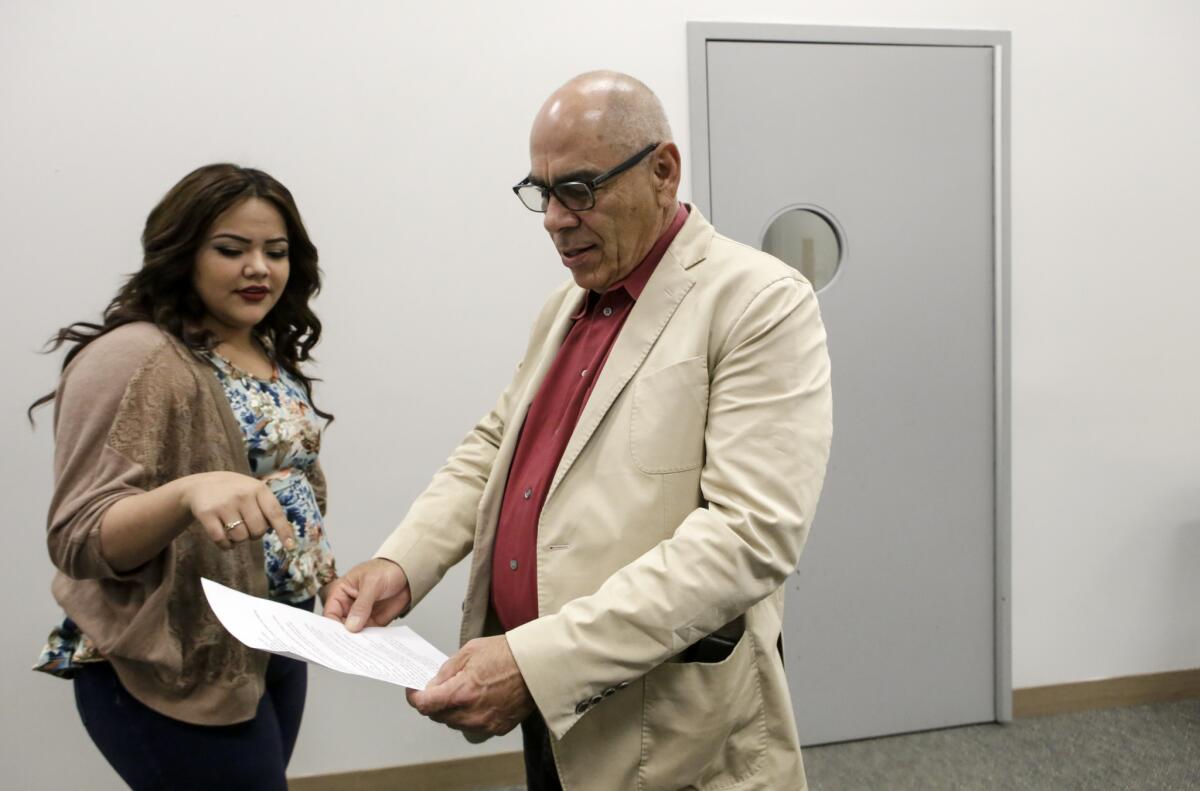That moment when you meet a famous author who shares your struggle

Poet Jimmy Santiago Baca talks to students at the Village Learning Complex about his experience of writing while incarcerated.
- Share via
Destiny Jennings used to write her father letters when he was in jail. She started when she was about 7 years old, and kept writing until she was a young teen.
Because of the letters, Jennings, now a high school junior, explored other forms of writing. She began to write poetry — sometimes about her father, sometimes about the anger she felt over his drug habit, or over her mother choosing her new boyfriend over her kids.
It was her 17th birthday on Thursday, when she met poet and writer Jimmy Santiago Baca. He taught himself to read and write during a five-year prison sentence on drug charges.
“Calla te, 17 today?” Baca said. “I’m honored.”
“You’re my birthday present,” Jennings told Baca in a classroom at the School of Extended Educational Options, an alternative high school for Pomona students at risk of dropping out.
Baca visited the school to talk to about 300 students from a few Pomona schools about his writing, and about transforming their past experiences into positive futures.
English teacher Henry Alan Loya asked Baca to speak to students from a group of Pomona schools after he met the author at a writing workshop in New Mexico. He thought meeting Baca could inspire the students to read more — in part because they were meeting a famous author, especially one who could relate to some of their life experiences.
The students were mostly Latino and many are at-risk or have life circumstances that require a flexible school schedule — that could include behavioral problems at previous schools, or issues like bullying, the need to maintain a job or an illness.
Loya asked Baca to first sit down for a private conversation with Jennings and Bryan Velazquez, a Pomona student who Loya is home-schooling after a car accident that’s left him unable to use his right hand. Baca’s memoir A Place to Stand was assigned reading for Loya’s classes.
Loya said he chose those two students because he thought they’d especially benefit from meeting the author — Jennings wants to be a writer and Velazquez, 18, needs to know that people can come back from tragedy and become successful.
The private session started with a question. “What do you want to know about me?” Baca asked Jennings.
She asked why he started writing poetry — was it a way to cope with struggle?
Yes, Baca said — he needed to figure out how to deal with his anger against an unjust society that was stacked against him and his community. People of color in the U.S. are told they don’t belong.
“It was my way of loving people who weren’t loved,” he told her.
Then he turned the questions on her. “Where do you come from?”
Jennings has lived all over California — she was in and out of homeless shelters with her mother as a child, and left her mother and boyfriend’s house a few years ago to live with her grandmother in Pomona.
“What do you do with that experience?” Baca asked her. “Have you ever thought of shaping it in a way that’s contributable to society? … Do you know how many people would like to know your life?”
She gave him a poem, typed and printed out, and asked him to read it later.

Poet Jimmy Santiago Baca, right, talks to student Destiny Jennings, 17, at the School of Extended Educational Options, an alternative high school, in Pomona.
Baca invited both Jennings and Velazquez to a student writing retreat on his ranch in New Mexico.
In both the private meeting and classroom speech, Baca spoke with language familiar to the students. He would drop in a Spanish curse word, talk about his dislike of authority, how he thought of his body as a war machine and not as something to take care of, and how that changed when he began to read and write poetry.
“To do bad things I had to force myself,” Baca said. “It doesn’t come naturally.” After he started reading, he stopped wanting to fight — he wanted to preserve his eyes so he could use them to read, he told the students.
Jocelyn Zamora, 17, wants to study English or political science at Georgetown University. She attends the alternative Pomona high school because she was bullied at her last school. She enjoyed Baca’s book, and she sat in the first row when Baca held a poetry-writing workshop for some of the students who wanted to stay back on Thursday.
“He kind of describes the way I feel sometimes,” Zamora said. “My dad is an alcoholic and my mother abandoned me” in the same way that Baca’s family left him, she said. Baca was raised by his grandmother until he was placed in an orphanage, from which he repeatedly ran away.
During the workshop, Baca talked about how students should address that pain in their writing.
“Confront the people that disappointed you,” he said. “Just be different. Be weird … Mira, the worst thing in the world is for you to be predictable.”
sonali.Kohli@latimes.com
Twitter: @Sonali_Kohli
More to Read
Sign up for Essential California
The most important California stories and recommendations in your inbox every morning.
You may occasionally receive promotional content from the Los Angeles Times.














